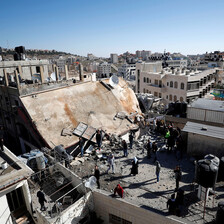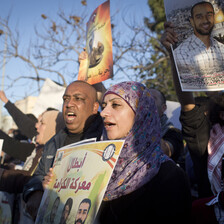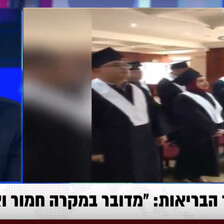The Electronic Intifada 30 October 2011
On Thursday 20 October, a group of approximately forty political activists based in Israel held a protest outside HaSharon prison in Kfar Saba to demand the release of all Palestinian political prisoners in Israeli jails, particularly the female prisoners who were excluded from the prisoner swap deal between Israel and Hamas.
According to the detainees and to a press released published by Adalah - the Legal Centre for Palestinian Minority Rights in Israel, when the protesters arrived at the prison, a representative of the Israeli police and a representative of the Israeli Prison Service (IPS) ordered them to hold the demonstration in an adjacent area and not on the grounds of the prison. The protesters were also ordered to end the protest at 5pm, less than hour after its start. However, at 4:55pm — shortly before the deadline given by the police had passed — a group of policemen ordered the demonstrators to stop the demonstration immediately on the grounds that it was “illegal.”
Although the protesters informed the officers that a prior agreement had been made with the IPS and the police representatives who had been present earlier, the police insisted that the protesters disperse immediately. Just as the demonstrators were making their way back to the bus and preparing to leave, the police assaulted those who were outside the bus without warning and violently arrested sixteen activists, including two minors, merely for being on the grounds.
On Wednesday 26 October, the Kfar Saba Magistrates Court transferred seven HaSharon protesters to house arrest for four to six days after the police had raided their houses, searched their computers and confiscated their mobile phones. The court also extended the detention of seven other protesters until Sunday, 30 October as well and extended the detention of a 17-year-old Palestinian who was released on 20 October and arrested again on 25 October, until Friday, 28 October.
Political arrests
Orna Kohn, an attorney with the rights group Adalah and a member of the legal defense team representing the detainees, told The Electronic Intifada: “This is clearly a political arrest; the arrest of the sixteen nonviolent protesters was illegal from the beginning and all the motions for extension are legally void.”
Kohn added that the demonstrators were charged with participating in non-permitted demonstration, yet the demonstration didn’t warrant a permit under Israeli law because of its small size. According to Israeli law, a protest of less than fifty participants doesn’t require permit.
The arrest motion that was submitted by the police to the court included the charge of calling for the capture of more Israeli soldiers in order to release all Palestinian political prisoners, which the police considered as incitement to violence and terror. The protesters, however, have vehemently denied voicing such slogans and the police admitted before the court that they had not yet managed to retrieve video recording which they claim prove that the demonstrators called for capturing more soldiers.
The defense team argues that even if some of the protesters had chanted such slogans, it would not constitute a legal offense, as it falls within the threshold of the constitutional right to freedom of expression, and doesn’t meet the criteria of “imminent, clear and present danger” test set by Israeli penal code.
Silencing dissent
Long-time pro-Palestinian activist Yoav Bar, who was among the detainees transferred to house arrest on Wednesday along with his wife Irys and son Adam, told The Electronic Intifada: “The arrest and all that has transpired during the interrogations and court hearings is an attempt by the fascist, undemocratic State of Israel to intimidate Palestinians and silence dissent.”
“The speech that the prosecutor gave before the court on Sunday had nothing to do with legal claims; it was imbued with mantras of patriotism, loyalty to the state and vile anti-Palestinian sentiments,” Bar added. “For a moment, I thought I was listening to Avigdor Lieberman [the extreme right-wing Israeli foreign minister].”
Furthermore, Bar claims that the decision of the court to extend the arrest of the activists was influenced by the pressure from the right wing.
“When we were arrested, we were almost certain we would be released the next day. But the following day, we noticed a change in the attitude towards us,” Bar said. “The treatment got much harsher. We were treated like traitors; and in his decision to extend our detention on Sunday by two days, the judge mentioned that we posed a danger to public safety. During the interrogation, we weren’t asked about the charges submitted against us; instead, we were asked irrelevant questions about the slogans written on our t-shirts. We were even accused of causing a car accident.”
Double standards
Yoav Bar pointed out that while the freedom of expression of Palestinians is shackled, Israeli fascists get away with their incitement and hate-mongering against Palestinians.
“When thousands of settlers chanted ‘Death to Arabs’ on Jerusalem Day, none of them were arrested, while we are being charged of incitement even though there is no evidence we called for the capture of more soldiers,” Bar said.
The case of HaSharon detainees is not closed yet as seven individuals are to appear for a court hearing on Sunday, 30 October to decide whether they will be released. But regardless of the outcome, the prolonged detention of nonviolent protesters proves that any remaining shreds of Palestinians’ freedom of expression are quickly disappearing.
Budour Youssef Hassan, originally from Nazareth, is a Palestinian socialist activist and fourth-year law student at the Hebrew University in Jerusalem. Follow her on Twitter at: twitter.com/Budouroddick.
Michael Treiger is a pro-Palestinian communist activist from Haifa.



